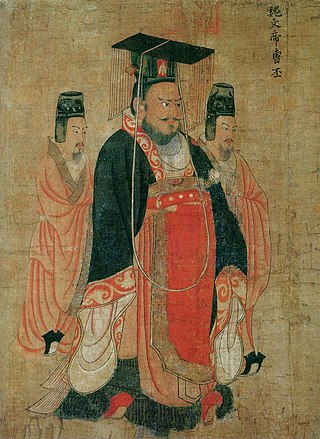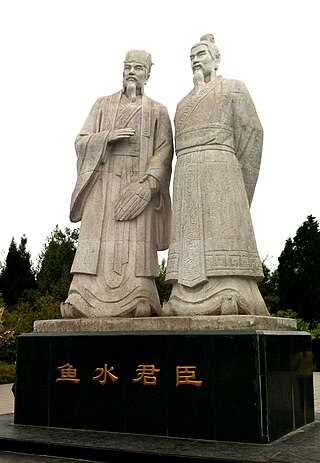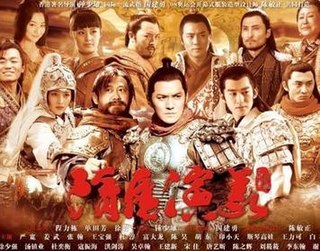This is a list of historical capitals of China.

Cao Pi, courtesy name Zihuan, was the first emperor of the state of Cao Wei in the Three Kingdoms period of China. He was the second son of Cao Cao, a warlord who lived in the late Eastern Han dynasty, but the eldest son among all the children born to Cao Cao by his concubine, Lady Bian. According to some historical records, he was often in the presence of court officials in order to gain their support. He was mostly in charge of defence at the start of his career. After the defeat of Cao Cao's rival Yuan Shao at the Battle of Guandu, he took Yuan Xi's widow, Lady Zhen, as a concubine, but in 221 Lady Zhen died and Guo Nüwang became empress.
The Five Tiger Generals is a popular appellation in Chinese culture for the top five military commanders serving under one lord. Although the term does not appear in Chinese historical records and is not used officially, it has been heavily used in literature texts, folklore, as well as popular culture.
For most of its history, China was organized into various dynastic states under the rule of hereditary monarchs. Beginning with the establishment of dynastic rule by Yu the Great c. 2070 BC, and ending with the abdication of the Xuantong Emperor in AD 1912, Chinese historiography came to organize itself around the succession of monarchical dynasties. Besides those established by the dominant Han ethnic group or its spiritual Huaxia predecessors, dynasties throughout Chinese history were also founded by non-Han peoples.

The Three Qins refer to three of the Eighteen Kingdoms, the short-lived power-sharing arrangement formed in 206 BC after the collapse of the Qin dynasty. The three kingdoms were located in Guanzhong Plain, the heartland of the Qin Empire.

The grand chancellor, also translated as counselor-in-chief, chancellor, chief councillor, chief minister, imperial chancellor, lieutenant chancellor and prime minister, was the highest-ranking executive official in the imperial Chinese government. The term was known by many different names throughout Chinese history, and the exact extent of the powers associated with the position fluctuated greatly, even during a particular dynasty.
Wei Guan, courtesy name Boyu, was a Chinese military general and politician of the state of Cao Wei during the Three Kingdoms period of China. He served under the Jin dynasty after the end of the Three Kingdoms period.

Romance of the Three Kingdoms is a Chinese television series adapted from the classical 14th century novel of the same title by Luo Guanzhong. The series was produced by China Central Television (CCTV) and was first aired on the network in 1994. It spanned a total of 84 episodes, each approximately 45 minutes long. One of the most expensive television series produced at the time, the project cost 170 million yuan. It was completed over four years and involved over 400,000 cast and crew members, including divisions of the People's Liberation Army from the Beijing, Nanjing and Chengdu military regions. Some of the dialogue spoken by characters was adapted directly from the novel. Extensive battle scenes, such as the battles of Guandu, Red Cliffs and Xiaoting, were also live-acted.

Fu Baoshi, or Fu Pao-Shih, was a Chinese painter from Xinyu, Jiangxi Province. He went to Japan to study the History of Oriental Art in the Tokyo School of Fine Arts in 1933. He translated many books from Japanese and carried out his own research. In painting itself, he brought Japanese visual elements to the Chinese ink painting tradition.
Guan Daosheng, also known as Guan Zhongji or Lady Zhongji, was a Chinese painter and poet who was active during the early Yuan dynasty. She is credited with being "the most famous female painter and calligrapher in the Chinese history...remembered not only as a talented woman, but also as a prominent figure in the history of bamboo painting." She is also a well-known poet in the Yuan dynasty.

Three Kingdoms is a 2010 Chinese television series based on the events in the late Eastern Han dynasty and the Three Kingdoms period. The plot is adapted from the 14th century historical novel Romance of the Three Kingdoms and other stories about the Three Kingdoms period. Directed by Gao Xixi, the series had a budget of over 160 million RMB and took five years of pre-production work. Shooting of the series commenced in October 2008, and it was released in China in May 2010.

The Sichuanese people are a Han Chinese subgroup comprising most of the population of China's Sichuan province and the Chongqing municipality.
Annotations to Records of the Three Kingdoms by Pei Songzhi (372–451) is an annotation completed in the 5th century of the 3rd century historical text Records of the Three Kingdoms, compiled by Chen Shou. After leaving his native land, Pei Songzhi became the Gentleman of Texts under the Liu Song Dynasty, and was given the assignment of editing the book, which was completed in 429. This became the official history of the Three Kingdoms period, under the title Sanguozhi zhu. He went about providing detailed explanations to some of the geography and other elements mentioned in the original. More importantly, he made corrections to the work, in consultation with records he collected of the period. In regard to historical events and figures, as well as Chen Shou's opinions, he added his own commentary. From his broad research, he was able to create a history which was relatively complete, without many of the loose ends of the original. Some of the added material was colourful and of questionable authenticity, possibly fictional. All the additional material made the book close to twice the length of the original. Pei Songzhi scrupulously cited his sources, and always introduced his opinion as such.

Heroes in Sui and Tang Dynasties is a Chinese television series based on Chu Renhuo's historical novel Sui Tang Yanyi, which romanticises the historical events leading to the fall of the Sui dynasty and the rise of the Tang dynasty. The series was first broadcast in mainland China on various television networks on 14 January 2013. It is not to be confused with Heroes of Sui and Tang Dynasties 1 & 2, a similar television series also based on the novel, but was released earlier in December 2012. Filming for the series started on 5 November 2011 at the Hengdian World Studios and wrapped up in May 2012.

Cao Cao is a Chinese television series based on the life of Cao Cao, a warlord who rose to power towards the end of the Eastern Han dynasty and laid the foundation for the state of Cao Wei in the Three Kingdoms period. Directed by Hu Mei, the series aimed to portray a more historically accurate image of Cao Cao, who is traditionally depicted as a villain in Chinese culture. Starring Zhao Lixin as the eponymous character, the series was filmed at the Xiangshan Film City in Ningbo, Zhejiang between 1 November 2011 and 15 March 2012.

The Advisors Alliance is a 2017 Chinese two-part television series based on the life of Sima Yi, a government official and military general who lived in the late Eastern Han dynasty and Three Kingdoms period of China. The series starred Wu Xiubo as the main character, with Liu Tao, Li Chen, Janine Chang, Tang Yixin, Yu Hewei and Wang Luoyong playing supporting roles. The first part of the series started airing on Jiangsu TV and Anhui TV on 22 June 2017. The second part started airing on Youku on 8 December 2017.